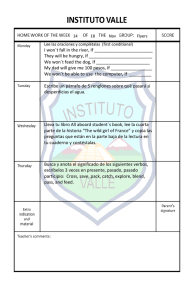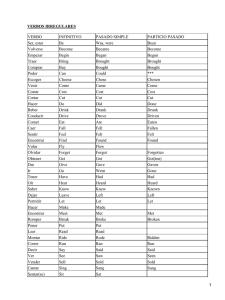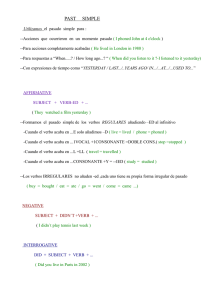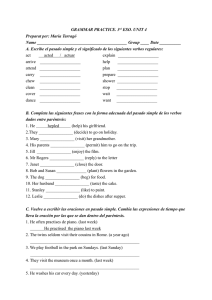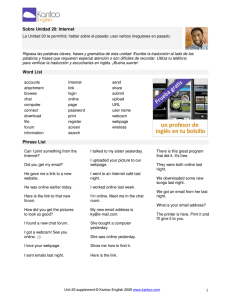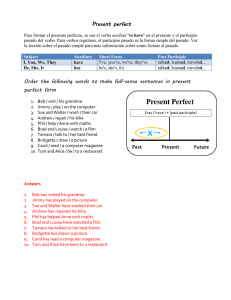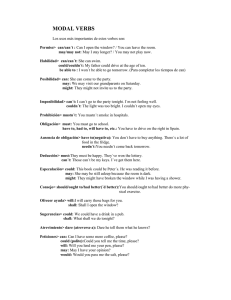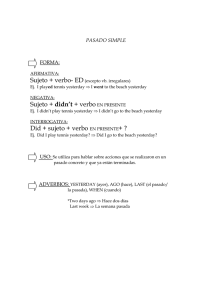Unidad 14
Anuncio
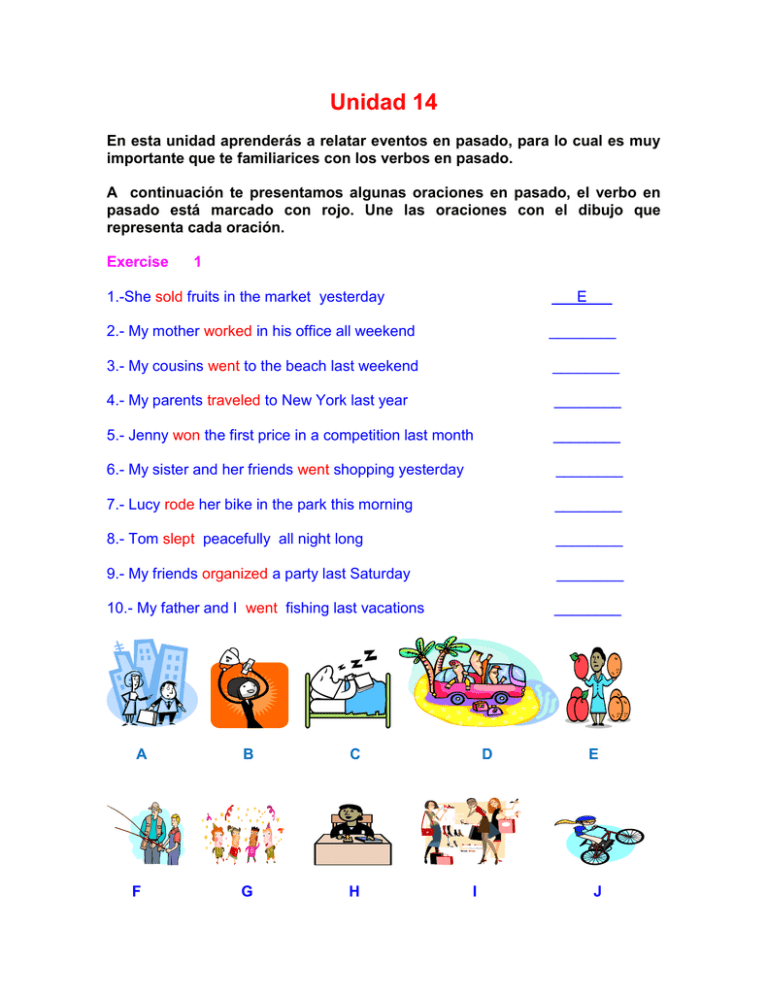
Unidad 14 En esta unidad aprenderás a relatar eventos en pasado, para lo cual es muy importante que te familiarices con los verbos en pasado. A continuación te presentamos algunas oraciones en pasado, el verbo en pasado está marcado con rojo. Une las oraciones con el dibujo que representa cada oración. Exercise 1 1.-She sold fruits in the market yesterday ___E___ 2.- My mother worked in his office all weekend ________ 3.- My cousins went to the beach last weekend ________ 4.- My parents traveled to New York last year ________ 5.- Jenny won the first price in a competition last month ________ 6.- My sister and her friends went shopping yesterday ________ 7.- Lucy rode her bike in the park this morning ________ 8.- Tom slept peacefully all night long ________ 9.- My friends organized a party last Saturday ________ 10.- My father and I went fishing last vacations ________ A B C F G H D I E J Exercise 2 Escribe debajo de cada dibujo la oración correcta a.- Luis played computer games all the afternoon b.- My sister watched TV all day c.- Luis wrote a poem to his girlfriend yesterday d.- My brother ironed his shirt last night e.- She cooked Chinese food yesterday f.- Toribio played his guitar last Saturday g.- Mike and Tiffany danced “Salsa” in a discoteque last Salturday h.- He ate pizza in Domino’s Pizza last Tuesday i.- She painted a picture in her last vacations 1.Luis wrote a poem to 2._____________________ 3.____________________ his girlfriend yesterday _____________________ ____________________ 4._________________ 5._____________________ 6.____________________ _________________ _____________________ ____________________ 7._________________ 8._____________________ 9.____________________ _________________ _____________________ ____________________ Checa las oraciones del ejercicio 1 y 2 de nuevo y analiza los verbos en pasado (letras en rojo) y contesta la siguiente pregunta. ¿Qué diferencia notas entre los verbos en pasado? Piensa …. Piensa …… Piensa…… Piensa …. Piensa …… Piensa…… Piensa …. Piensa …… Piensa…… Tal vez llegaste a la conclusión que algunos terminan en “ed” y otros no. Si no es así observa los verbos nuevamente y checa esta diferencia. La razón por la cual unos verbos en pasado terminan en “ed” y otros no es la siguiente: Existen dos clases de verbos en pasado: los regulares y los irregulares. Los verbos regulares son los que terminan en “ed” Ejemplo: Verbo presente pasado Jugar Limpiar Lavar played cleaned washed play clean wash Los verbos irregulares son los que terminan en cualquier cosa pero no en “ed” Ejemplo: Verbo presente Ir Comer Beber go eat drink pasado went ate drank Talvez te estés preguntando como saber como saber cuando los verbos son regulares y cuando son regulares. NO EXISTE UNA REGLA MAGICA PARA SABER TAL COSA. Lo único que puedes hacer es MEMORIZAR los verbos en pasado. Aquí esta una lista de verbos regulares e irregulares. Si algún verbo que quieras saber en pasado no esta en la lista. Aquí están unas ligas de Internet que puedes consultar para ver mas listas de verbos. http://www.speakspeak.com/html/d2f_resources_irregulares_verbos_ingles_es.htm http://www2.udec.cl/~alualem/ingles/lvi.html http://www.mansioningles.com/gram53.htm http://www.geocities.com/profesorcesar2003/ingles.html http://www.englishpage.com/irregularverbs/irregularverbs.html Present Simple Past Spanish answer answered responder arrive arrived llegar ask asked preguntar be i was / were ser borrow borrowed tomar prestado break i broke romper buy i bought comprar catch i caught atrapar clean cleaned limpiar climb climbed escalar collect collected colleccionar come i came venir compose composed componer cook cooked cocinar cut i cut cortar dance danced bailar describe described describir discover discovered descubrir do i did hacer drink i drank beber drive i drove conducir eat i ate comer enjoy enjoyed disfrutar fall i fell caer feel i felt sentir find i found encontrar fly i flew volar forget i forgot olvidar give i gave dar go i went ir happen happened suceder have i had tener help helped ayudar hurt i hurt herir, doler invent invented inventar invite invited invitar kill killed matar know i knew saber lend i lent prestar leave left dejar lie lay yacer like liked gustar live lived vivir look looked mirar love loved amar make made hacer meet met conocer, encontrar miss missed perder, extrañar open opened abrir pack packed empacar pay paid pagar phone phoned llamar por teléfono play played jugar prefer preferred preferir prepare prepared preparar push pushed empujar put i put poner rain rained llover read i read leer remember remembered recordar rent rented alquilar rescue rescued rescatar return returned volver, devolver ring rang llamar por teléfono save saved ahorrar say said decir search searched buscar see saw ver sell sold vender sit sat sentarse skate skated patinar ski skied esquiar sleep slept dormir smell smelled oler speak spoke hablar spend spent gastar start started comenzar stay stayed quedarse stop stopped detener study studied estudiar survive survived sobrevivir swim swam nadar take took tomar talk talked hablar teach taught enseñar tell told decir think thought pensar throw threw lanzar touch touched tocar try tried intentar use used usar visit visited visitar wait waited esperar walk walked caminar want wanted querer wash washed lavar watch watched mirar wear wore llevar puesto work worked trabajar write wrote escribir Ejercicio 3 Ahora que tienes las listas de verbos en pasado, apóyate en un diccionario y traduce las oraciones del ejercicio 1 y 2 al español. Ejemplo: She sold fruits in the market yesterday Ella vendió frutas en el mercado ayer Ejercicio 4 Una vez que traduzcas las oraciones, analiza sus componentes e identifica los siguientes elementos. Subject – verb in past – object – place – time Sujeto verbo en pasado objeto lugar tiempo Ejemplo: (con la oración 1 del ejercicio 1) She sold fruits in the market yesterday. Subject: Verb in past: Object: Place: Time: she sold fruits in the market yesterday *No todas las oraciones contienen o llevan todos los elementos Simple past affirmative La formula para hacer oraciones afirmativas es como sigue: Persona + verbo en pasado + Pedro * Pedro ate comió objeto + hamburgers lugar + tiempo. in Burger King Ejemplo: yesterday hamburguesas en Burger king ayer La persona puede ser un pronombre personal, o el nombre de la persona, como en el ejemplo. Personas: I, you, he, she, it , we, you, they Yo, tu, el, ella, ello nosotros, uds, ellos El tiempo, como estamos hablando en pasado son palabras que te refieran al tiempo pasado. Tales como: Ayer : La semana pasada: El mes pasado: El fin de semana pasado: yesterday last week last month last weekend El sábado pasado: Antier: En 1999 last Saturday the day before yesterday in 1999 Observa de nuevo la regla para hacer oraciones afirmativas y ordena las siguientes oraciones: Persona + verbo en pasado + objeto + lugar + tiempo. Exercise 5 1.-went / Jenny / last Sunday / to the cinema ____________________________ 2.- my father / in his office / last weekend / worked _________________________ 3.- bought / I / a new computer/ last month ________________________________ 4.- They / in the library / did / their / homework _____________________________ 5.- soccer / last Saturday / we /played 6.- late / the plane / arrived __________________________________ ___________________________________ 7.- My mother/ early / got up / today _____________________________________ 8.- coffee and bread/ had/ for breakfast / I ________________________________ Ejercicio 6 Ahora que ya conoces algunos verbos en pasado ya puedes empezar a formular oraciones en pasado. Trata de relatar cosas que hiciste el pasado fin de semana (last weekend). Al menos 10 actividades. Example Last Saturday I got up late , then I ate “chilaquiles for breakfast. After breakfast, I cleaned my room and did homework. In the afternoon, I went to the movies with my friends ……etc. In the evening I….. On Sunday I ….. Simple past negative Para hacer oraciones negativas en pasado se debe seguir la siguiente formula Persona + didn’t + verb in present + object + place + time. Ejemplo: I didn’t Yo no study estudié mathematics in the library yesterday matemáticas en la biblioteca ayer La persona puede ser un pronombre personal : I You He She It We You They O bien el nombre o nombres de personas : Mary, Peter , Tom and Sue Y también familiares : my brother , my sister, my cousins, my parents Exercise 7 Observa el formato anterior y ordena las siguientes oraciones Example: * Chinese food / my mom / cook / didn’t / yesterday My mom didn’t cook Chinese food yesterday 1.- didn’t / do / Jenny / last week / exercise ______________________________________ 2.-study / They / for the exam / didn’t ______________________________________ 3.- My bothers / last Sunday / play / didn’t / soccer _______________________________________ 4.- to school / Luis / go / last Monday / didn’t ______________________________________ 5.- visit / I / my grandmother / didn’t / last vacations ___________________________________________ 6.- drive / didn’t / her car / last weekend / Sofía ___________________________________________ 7.- their room / clean / they / last Saturday / didn’t ___________________________________________ 8.- classes / we / have / last week / didn’t ___________________________________________ 9.- work / in the office / I / last week / didn’t ___________________________________________ 10.- didn’t / they / to the Beach / last summer / go ____________________________________________ Accesa a Internet e ingresa a estas direcciones de para practicar este tema. Imprime los ejercicios y resuélvelos a mano, para que puedas mostrarle a tu maestro tu trabajo. http://www.geocities.com/metwallyali/grammar/inter/past_neg.htm http://www.ego4u.com/en/cram-up/grammar/simple-past/exercises?05 http://www.englischhilfen.de/en/exercises/tenses/simple_past_negation_sentences.htm http://www.englischhilfen.de/en/exercises/tenses/simple_past_negation_sentences2.htm http://www.englischhilfen.de/en/exercises/tenses/simple_past_negation_sentences3.htm Busca tu propio material de trabajo en Internet respecto a este tema , usando el siguiente criterio de busqueda en tu buscador favorito (Google o cualquier otro) En la barra de busqueda puedes escribir lo siguiente: Simple past negative form+ELT O bien Simple past negative exercises+EFL ELT significa English Language Teaching EFL significa English as a Foreign Language El limitar la búsqueda con las anteriores siglas te lleva a accesar a ejercicios actividades especialmente diseñados para estudiantes que están aprendiendo Ingles. Google te va a presentar muchos ejercicios con este tema, selecciona los 5 que mas te llamen la atención e imprímelos y resuélvelos. Preséntaselos a tu maestro como evidencia de desempeño. Simple past questions Hay 2 tipos de preguntas en pasado, las 1.- yes / no questions 2.-Wh questions Yes/ No questions??????????? Para hacer preguntas “yes / no” en pasado sigue el siguiente formato: Did + persona + verbo en presente + complemento…….? Ejemplo: I Did you he she It We You they go to the movies yesterday ? * La persona tambien puede ser un familiar o el nombre de alguien (Peter, Laura, Tom and Sue , my father, my cousins, firulais etc….. ) Mas ejemplos: A: Did Pepe and Toño study for the exam yesterday? B: Yes, they did. They studied all day yesterday A: Did Laura go shopping last weekend? B: No, she didn’t. She stayed home Como podrás notar las preguntas “yes / no” se responden así porque siempre se responden con “sí” o “no” , ya después puedes dar información extra como en los ejemplos anteriores, pero es opcional. Exercise 8 Ordena las siguientes oraciones: 1.- You / did / play / last / soccer / Sunday / ? 2.- Jenny / go / last Summer / to the beach / did / ? 3.- your parents / did / buy / last year / a house ? 4.- you / go to the movies / yesterday / did? 5.- do / his home work / did / Pedro ? 6.- your father / work / yesterday / did ? 7.- cook / María / dinner / did / last night / ? Exercise 9 Observa los siguientes dibujos y contesta las preguntas con He Yes, she It They did. O he No, she it they didn’t Cada vez que digas que “no”, da la información correcta Example: Did she eat a hamburger ? no, she didn’t . She ate some ice cream 1.-Did the giraffe eat leaves? ___________________________ 3.-Did Mary win the first prize? _________________________ 2.- Did Mary relax during the weekend? ______________________________ 4.- Did Pedro play soccer in the afternoon? _______________________________ 5.-Did Mary clean yesterday? 6.-Did Hugo and Lola ride their bikes yesterday? _________________________ _________________________________ “Wh” questions Las preguntas “wh” no se contestan con “sí “ o con “no” , como las preguntas anteriores, se contestan con información específica. Estas preguntas se llaman así porque empiezan con una palabra que empieza con “wh” como: Where = Donde Who = Quien What = Que o Cual When = Cuando Why = Porque La formula para hacer estas preguntas es Palabra “WH” + Did + persona + verbo en presente + complemento…….? Ejemplo: Where Did I you he she It We You they play ? Estas preguntas las usan mucho los reporteros para obtener mas información de lo que dicen las celebridades. Imagina que Madonna dice a su llegada a Inglaterra dice: I fainted ! O sea : me desmaye! Lo que le preguntarían los reporteros sería algo así como: Reporters Madonna Where did you faint ? When did Why did you What did Who did you go with ? you faint at the airport ? faint ? you do afterwards? two hours ago because I didn’t eat well today I went to the hospital with my manager Exercise 10 Que preguntas le harías a una persona que dice lo siguiente, escribe al menos 3 preguntas , e inventa la respuesta I played soccer 1.-__________________________________? ________________________ 2.-__________________________________? ________________________ 3.-__________________________________? ________________________ he drank tequila 1.-__________________________________? ________________________ 2.-__________________________________? ________________________ 3.-__________________________________? ________________________ Jenny went shopping 1.-__________________________________? ________________________ 2.-__________________________________? ________________________ 3.-__________________________________?_________________________ Answer key (clave de respuestas) Exercise 1 1.- E 2.- H 3.- D 4.- A 5.- B 6.- I 7.- J 8.- C 9.- G 10.- F Exercise 2 1.- C 2.- A 3.- I 4.- F 5.- G 6.- E 7.- B 8.- H 9.- D Ejercicio 3 1.-Ella vendió frutas en el mercado ayer 2.-My mama trabajo en su oficina todo el fin de semana 3.- Mis primos fueron a la playa el pasado fin de semana 4.- Mis papas viajaron a Nueva York el año pasado 5.-Jenny gano el primer premio en una competencia el mes pasado 6.- Mi hermana y sus amigos fueron de compras ayer 7.- Lucy montó su bicicleta en el parque esta mañana. 8.-Tom durmio tranquilamente toda la noche 9.- Mis amigos organizaron una fiesta el pasado sabado 10.-Mi papa y yo fuimos a pescar las pasadas vacaciones a.- Luis jugó video juegos toda la tarde b.- My hermana vio la tv todo el dia c.- Luis le escribio un poema a su novia ayer d.- My hermano planchó su camisa anoche e.- Ella cocinó comida China ayer f.- Toribio jugó con su guitarra el sabado pasado g.- Mike and Tiffany bailaron Salsa en una discoteque el sabado pasado h.- He comió pizza en Domino’s Pizza el pasado Martes i.- ella pintó un cuadro en sus vacaciones pasadas Exercise 4 Subject: Verb in past: Object: Place: Time: my mother worked ---------------------- no hay objeto in her office last vacations Subject: Verb in past: Object: Place: Time: my cousins went ---------------------- no hay objeto to the beach last weekend Subject: Verb in past: Object: Place: Time: my parents traveled ---------------------- no hay objeto to New York last year Subject: Verb in past: Object: Place: Time: Jenny won the first prize in a competition last month Subject: Verb in past: Object: Place: Time: my sister and her friends went shopping ---------------------- no hay objeto ---------------------- no hay lugar yesterday Subject: Verb in past: Object: Place: Time: Lucy rode her bike in the park this morning Subject: Verb in past: Adverb: Place: Time: Tom slept peacefully ---------------------no hay lugar all night Un adverbio describe como se realizó una actividad Subject: Verb in past: Object: Place: Time: my friends organized a party ---------------------no hay lugar last Saturday Subject: Verb in past: Object: Place: Time: My father and I went fishing --------------------------no hay objeto ---------------------no hay lugar last vacations Subject: Verb in past: Object: Place: Time: Luis played video games ---------------------no hay lugar all afternoon Subject: Verb in past: Object: Place: Time: My sister watched TV ---------------------no hay lugar all day Subject: Verb in past: Object: Place: Time: Luis wrote a poem to her girfriend ---------------------no hay lugar yesterday Subject: Verb in past: Object: Place: Time: My father and I went fishing --------------------------no hay objeto ---------------------no hay lugar last vacations Subject: Verb in past: Object: Place: Time: My brother ironed his shirt ---------------------no hay lugar last night Subject: Verb in past: Object: Place: Time: She cooked Chinese food ---------------------no hay lugar yesterday Subject: Verb in past: Object: Place: Time: Toribio played with his guitar ---------------------no hay lugar last Saturday Exercise 5 1.- Jenny went to the cinema last Sunday 2.- my father worked in his office last weekend 3.- I bought a new computer last month 4.- They did their homework in the library 5.- We played soccer last Saturday 6.- the plane arrived late 7.- My mother got up early today 8.- I had coffee and bread for breakfast Exercise 6 Answers may vary. They need revision and assessment from tutors. Exercise 7 1.- Jenny didn´t do exercise last week 2.- They didn’t study for the exam 3.- My bothers didn’t play soccer last Sunday 4.- Luis didn´t go to school last Monday 5.- I didn´t visit my grandmother last vacations 6.- Sofía didn´t drive her car last weekend 7.- they didn’t clean their room last Saturday 8.- we didn’t have classes last week 9.- I didn´t work in the office last week 10.- they didn’t go to the beach last summer Exercise 8 1.- Jenny no hizo ejercicio la semana pasada 2.- ellos no estudiaron para el examen 3.- mis hermanos no jugaron futbol el pasado Sabado 4.- Luis no fue a la a la escuela el pasado Lunes 5.- Yo no visité a mi abuela las pasadas vacaciones 6.- Sofía no manejo su carro el pasado fin de semana 7.- Ellos no limpiaron su cuarto el pasado Sábado 8.- Nosotros no tuvimos clases la semana pasada 9.- Yo no trabajé en la oficina la semana pasada 10.- Ellos no fueron a la playa el pasado verano Exercise 9 1.-yes, it did. 2.-no, she didn’t. She worked in her office 3.-yes, she did 4.-no, he didn’t. He studied 5.-no, she didn’t. She went shopping 6.-yes, they did. Exercise 10 Las respuestas pueden variar. Ejemplo: Where did you play? In the stadium When did you play? Last Sunday What time did you play? At 10:00 am Where did he drink tequila? In “ Barra Brava” When did he drink tequila? Last Friday Who did he drink tequila with? With his brother What time did she go shopping? At 10:00 am Where did she go shopping? Downtown When did she go shopping? yesterday Unit 14 Exam Activity 1: Escribe el verbo en pasado y su significado en español Ejemplo: visit→ visited visitar 1. go → 2. come → 3. buy → 4. have → 5. do → 6. get up → 7. eat → 8. drink → 9. study → 10. watch → Activity 2: Completa con la forma del pasado simple que falta positive negative Yes/ no question Jane played tennis Sean did not work. Did I have a cat? Mary did not sing. Did she see us? Activity 3.- Transforma a pasado las siguientes oraciones Ejemplo: Tom goes to school Tom went to school 1. We open the door. → 2. You write poems. → 3. Richard plays in the garden. → 4. Kerry does not speak English. → 5. Do you see the bird? → Activity 4.- Escribe un a pregunta “Wh” para cada oración Ejemplo: Peter drank a soda What did Peter drink? 1. Billy ate an apple. 2. The children played in the garden. 3. Laura came home at six o'clock. 4. The boy read a book. 5. The girl went to the movies yesterday. Activity 5.- Completa las oraciones con la forma correcta del pasado 1. Last year I (spend) 2. I (travel) my holiday in Ireland. around by car with two friends and we (visit) lots of interesting places. 3. In the evenings we usually (go) 4. One night we even (learn) to a bar some Irish dances. 5. It (not / rain) a lot. 6. But we (see) some beautiful rainbows. 7. Where (spend / you) your last holiday? Activity 6.- Lee el siguiente texto y contesta las preguntas Ana Paquin is a famous Hollywood actress. She began her career when was part of the film “The Piano” . Paquin's previous experience was a role in a school play. During her childhood, she had little interest in acting, although she did have a well-rounded cultural life as she played the viola, cello and piano and she participated in gymnastics, ballet, swimming and downhill skiing. Paquin completed her high school education in Los Angeles, where she moved with her mother following her mother's divorce in 1995. Five years later, Paquin again achieved notariety in her role as “Rogue” in the blockbuster X-Men movie, its sequel in 2003 and the third installment in 2006. That summer, she completed filming Blue State. She also was the executive-producer of the film through her company Paquin Films, a production company co-owned by her brother, Andrew. After several more movie gigs, Paquin landed the role of Sookie Stackhouse in the HBO series, True Blood. This role was her first television appearance and won a Golden Globe for Best Actress in a Television Drama Series for her role in the show. 1.- Who is Ana Paquin? 2.-What was her first movie? 3.- Did she play musical instruments when she was a child? 4.-What sports did she practice in the past? 5.-When did she move to Los Angeles? 6.-Mention 2 movies in which she acted 7.-What award did she win for her TV series? Activity 7: escribe un párrafo acerca de tus actividades el pasado fin de semana. Escribe al menos 60 palabras. Es muy importante que hagas esta actividad porque generalmente en el examen escrito se te pide hacer una composición. ¿Te acuerdas del último examen? Ejemplo: Last Saturday I got up at 9:00 am, then I ate breakfast. I ate eggs, “chilaquiles” and fruit. I drank some coffee. After breakfast I washed my car and cleaned my room. In the afternoon I went to the movies. I saw “AVATAR”. We had popcorn and sodas. In the evening I visited my girlfriend and then we went to the disco. We danced pop music, and drank “Tequila”. We had a lot of fun We went home very late. I went to bed at 3:00 am On Sunday I got up at 11:00. Then I had breakfast. I ate hotcakes. Then, I watched TV and listened to music. In the afternoon I played soccer with my friends. In the evening I studied for an exam. __________________________________________________________________ __________________________________________________________________ __________________________________________________________________ __________________________________________________________________ __________________________________________________________________ __________________________________________________________________ __________________________________________________________________ __________________________________________________________________ __________________________________________________________________ Clave de respuestas Activity 1 go → went come → came buy → bought have → had do → did got up get up → eat → ate drink → study → watch → drank studied watched Activity 2 Complete the table in simple past. positive negative question Jane played tennis Jane didn’t play tennis Did Jane play tennis? Sean worked. Sean did not work. Did Sean work? I had a cat. I did not have a cat. Did I have a cat? Mary sang. Mary did not sing. Did Mary sing? She saw us. She did not see us. Did she see us? Activity 3 1. We open the door. → We opened the door. 2. You write poems. → You wrote poems. 3. Richard plays in the garden. → Richard played in the garden. 4. Kerry does not speak English. → Kerry did not speak English. 5. Do you see the bird? → Did you see the bird? Activity 4 1. Billy ate an apple. What did Billy eat? 2. The children played in the garden. Where did the children play? 3. Laura came home at six o'clock. When did Laura come home? 4. The boy read a book. Who read a book? 5. The girl went to the movies yesterday. When did the girl go to the movies? o bien what did the boy read? Activity 5 1. Last year I spent my holiday in Ireland. 2. I travelled around by car with two friends and we visited 3. In the evenings we usually went 4. One night we even learned 5. It did not rain 6. But we saw 7. Where did you spend lots of interesting places. to a pub. some Irish dances. a lot. some beautiful rainbows. your last holiday? Activity 6 1.- Who is Ana Paquin? A famous actress 2.-What was her first movie? “The piano” 3.- What musical instruments did she play in the past? Viola, cello and piano 4.-What sports did she practice in the past? gymnastics, ballet swimming and down hill skiing 5.-When did she move to Los Angeles? In 1995 6.-Mention 2 movies in which she acted: “The piano”, “X-men” , “Blue State” 7.-What award did she win for her TV series? “The Golden Globe” Activity 7 La respuesta varía en cada estudiante.
